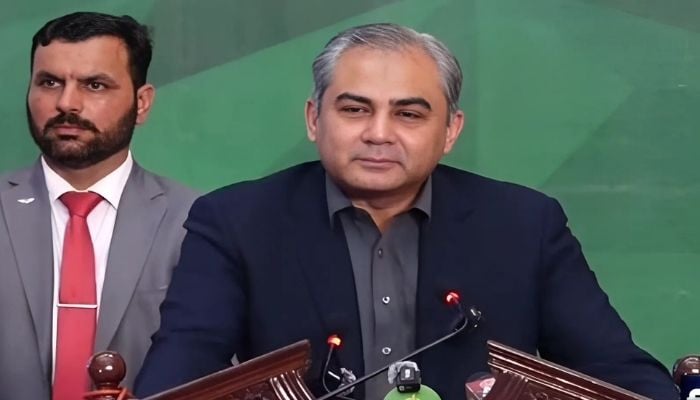
Interior Minister Mohsin Naqvi addresses a seminor in Lahore on August 17, 2025. — Screengrab via Geo News
#Pakistan #video #evidence #downed #Indian #jets #Naqvi
Interior Minister Mohsin Naqvi said on Sunday that Pakistan had video evidence of six Indian fighter jets that were shot during the recent dispute.
The Home Minister said that Islamabad had the intelligence of the time strategies for the war in New Delhi.
“When his plane was shot, we decided not to announce numbers without proof,” Naqvi said. He was addressing a seminar organized by Professor Wars Mir Foundation in Iqbal, Lahore, on the theme of the “global impact of the Pakistan Army and diplomatic conquests on India”.
He said that he was an eyewitness to many incidents during the war in Pakistan India and was directly involved in several cases.
He paid tribute to the Pakistan Army, Air Force and Navy officers and soldiers, emphasizing the important role played by intelligence agencies in winning the country.
The interior minister said the services of intelligence officers, whom they described as “silent fighters”, were unforgettable.
He remarked, “Whether it was India’s war plan or their plane ended, our agencies already had access to every move.”
“Within a few minutes, we had videos of field evidence of six Indian aircraft that were dropped,” he said, adding that such achievements are evidence of the capabilities and sacrifices of Pakistan’s intelligence community.
He highlighted it as a “divine help”, Naqvi reminded that India fired seven missiles at a major Pakistani base, but no one landed.
“Something fell before reaching, the other fell out or in the side.
“On the contrary, when Pakistan launched missiles in Indian military installations near the civilian areas, they target India’s largest oil storage depot, and completely destroy it,” he said.
The minister added that Indian forces also tried to attack Pakistani airports, including Noor Khan, but they faced limited success.
He observed, “Except for the base where our soldiers accepted the martyrdom, there was no major loss. It was completely the help of Allah.”
Naqvi praised the leadership of Field Marshal Syed Asim Munir and said that he helped “great courage and bravery” during the dispute.
He described an encounter when an Saudi delegation visited Pakistan during the crisis.
“Field Marshal told them,” India is like a shining Mercedes, but we are like a dumper truck loaded with stones. If they collide, imagine the result. ” The delegation remained silent, “he said.
According to the Minister, under a united plan, Pakistan’s historic success was for the first time a joint war strategy through its army, air force, and the Navy.
On the contrary, he said that Indian military chiefs were divided into their decision -making, Prime Minister Narendra Modi of each meeting was kept separate.
He noted, “The world saw the result of this distortion. Naqvi also pointed to Ajit Doval and Amit Shah as the true architect of India’s war strategy.
“This is not just Modi, there are two men behind the whole drama.
He emphasized, “He will bring destruction to Modi along with India in the future.”
He praised Pakistan’s political unity during the crisis and said that all parties, including Prime Minister and Maulana Fazlur Rehman, stand firmly behind the armed forces.
“On the diplomatic front, India tried to lobby in the United States but failed, while our PPP chairman performed better than him,” he said.
Securityzar further alleged that India, especially in Balochistan, accused of supporting terrorism in Pakistan.
“Since 9/11, India has been the biggest benefit of terrorism,” he said. He tried to turn Kashmir’s political struggle into a terrorist movement, but failed. “
He added that after India’s attacks on Pakistan, there was a lot of international pressure on not taking retaliation.
“But both the Prime Minister and the Field Marshal deserve reputation to resist this pressure and give India a proper response,” Naqvi said.
Senate Chairman Syed Yousuf Raza Gilani and Punjab Assembly Speaker Malik Muhammad Ahmed Khan also addressed the seminar and paid tribute to Pakistan’s armed forces and diplomatic flexibility.
Pakistan and India were engaged in the military confrontation in May 2025, in April, the Indian illegally occupied Jammu and Kashmir (IIOJK) attacked tourists, which New Delhi accused of Islamabad, had already agreed with a ceasefire.
In response to Indian aggression, Pakistan’s armed forces launched a massive retaliation, named “Operation Bonyan Um-Marsus” and targeted several Indian military targets in several areas.
Pakistan dropped six Indian fighter jets, including three Rafale, and dozens of drones. At least 87 hours later, the war between the two countries equipped with nuclear weapons ended May 10 with a ceasefire agreement by the United States.
After Washington spoke with the two sides, US President Donald Trump first announced the ceasefire on social media, but India is different from Trump’s claims that his intervention and endeavor to end trade negotiations.






